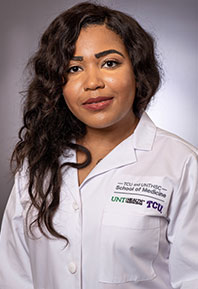Dallas Morning News
Fort Worth Medical Student Selected As AAMC Liaison
TCU and UNTHSC School of Medicine student Charna Kinard was elected to the Association of American Medical Colleges (AAMC) Organization of Student Representatives.
FORT WORTH – TCU and UNTHSC School of Medicine student Charna Kinard will serve as a member of the Association of American Medical Colleges (AAMC) Organization of Student Representatives for the 2021-2022 academic year.
In this role, Kinard, a third-year medical student, will be the liaison for the Fort Worth medical school and provide input to the AAMC on behalf of the students at the medical school.
“It just really hits all the things I’m passionate about,” Kinard said. “As a non-traditional student, I truly believe in the holistic process and review of an applicant for medical school and for residency. I also feel like our medical school embodies that and taking that holistic process into account for a candidate.”

The students selected by the OSR serve as the primary link between the OSR Administrative Board and committee. OSR liaison appointments are one-year terms that are renewable yearly by the OSR until the medical student graduates from their institution.
The OSR is divided into seven different committees:
- Advancing Holistic Principles Advisory Committee (HRPAC)
- Electronic Residency Application Service (ERAS®)
- Careers in Medicine Advisory Committee
- Group on Institutional Planning Steering Committee
- Group on Student Affairs – Committee on Admissions (GSA-COA)
- Student Surveys Advisory Committee
- Visiting Student Learning Opportunities (VSLO) Advisory Committee
“Charna’s role as a part of the Advancing Holistic Principles Advisory Committee within the AAMC is well suited for her strengths as a powerful and passionate leader as well as her love for supporting fellow students,” said Danika Franks, M.D., assistant dean for Student Affairs at the TCU and UNTHSC School of Medicine. “As our medical school grows, these connections contribute to the knowledge of our program both nationally and internationally, and most specifically illuminates how the training that develops Empathetic Scholars® is transforming healthcare.”
The OSR collectively looks at ways to address disparities in the pre-medical, medical and graduate medical application process.
“The committee is at a point where they have collected a lot of data and now they can begin to consider doing more pilot programs that can help increase transparency,” Kinard said. “We’re addressing the disparities as far as representation.”
The AAMC leads and serves the academic medicine community to improve the health of people everywhere. Founded in 1876 and based in Washington, D.C., the AAMC is a not-for-profit association dedicated to transforming health through medical education, health care, medical research, and community collaborations, according to the AAMC website.
The AAMC also houses the American Medical College Application Service® (AMCAS®), which is a centralized medical school application processing service. Most U.S. medical schools use AMCAS as the primary application method for their first-year entering classes.
Medical students are the individuals who are most impacted by any changes made by the AAMC, Dr. Franks added.
“As medical education evolves, the transition from undergraduate medical education to graduate medical graduation and the processes that are involved are changing at a rapid pace,” Dr. Franks said. “Medical students should have a significant voice at the table to share their perspectives, experiences, concerns and ideas for all processes that govern this transition.”